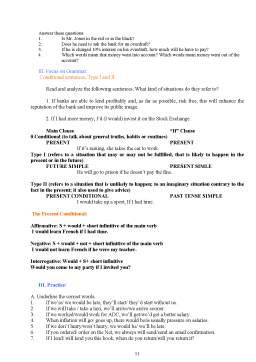Extras din curs
UNIT 1: INFLATION
I. Reading session:
„One of the most intractable problems confronting societies in transition from centralized to free market economies is that of inflation. It is, however, a challenge that such societies must meet if they are to enjoy the material benefits that a market economy can provide.
Inflation is an increase in the average price level of the goods and services produced and sold in an economy. Inflation typically occurs in a market economy for on of two reasons: either people increase their spending faster than producers are able to increase the supply of the goods and services; or there is a decrease in the supply of goods and services to consumers and/or producers, which drives up prices. Inflation has sometimes been described as an increasing amount of money chasing a shrinking number of goods.
Inflation hits economies in transition hard because price liberalization – the removal of government control of prices – is an essential step towards a market economy. The initial result of such price liberalization is predictable – a wave of price increases for goods that were in chronic short supply. Why? Because the government held their prices artificially low, so demand perennially outstripped supply, or because of other economic distortions and inefficiencies created by government decision-makers. In addition, if people are holding large amounts of money at the time of this transition (since there was little of value to buy) the pressure of inflation can be even greater.
Nevertheless, the rewards of enduring the inevitable bout of inflation during this transitional period are substantial. Unfettered by government, the market mechanisms of supply and demand can begin to function. High prices signal strong demands and the market, albeit slowly and haltingly at first, responds with increased production. People’s money may have lost value, but what money they have is now real and consumers can buy the goods that are beginning to appear in stores. With supply increasing, prices stabilize and queues begin to disappear as consumers realize that more and varied products will continue to be available for sale.
Entrepreneurs and investors respond to the new economic freedom by starting new business and competing to provide goods and services, thereby creating jobs expanding supply and causing prices to moderate further.
The key element in this transition is for the government to relinquish its role setting prices and permit the market forces of supply and demand to establish prices for virtually all goods and services. When such a free market is established, inflation may persist, but it is a far more manageable and less threatening problem than in the early, hard days of economic transition.”
(What is Market economy, USIS, 1992)
MONETARY POLICY
“Monetary policy is how the government tries to improve the country’s economy by using banks and money, acting on the level of deposits and loans, and on interest rates and exchange rates.
As well as keeping inflation low, a government will seek to keep unemployment low and output rising. However, it cannot do all three things at the same time. For instance, it is very successful in lowering unemployment, the shortages of workers may cause wages to rise, as employers bid for more employees. The workers will spend their increased wages in the shops and this may cause prices to rise – thereby causing inflation to rise.
A government may have to choose therefore between these aims or goals. Mrs. Thatcher’s (in office between1979 – 1990) government chose the reduction of inflation as the goal which should be given the utmost priority. Unemployment, economic growth and the enormous gap between exports and imports were not considered so important.”
(Banking: The Business, Pitman, 1990, pp.27-28)
II. Answer the following three questions based on what you have just read.
What is inflation?
What causes inflation?
What is meant by monetary policy?
III. Focus on Grammar: Ways of expressing future
A. Future Simple:
Forms: Affirmative: Subject + will + short infinitive of the main verb
I will (I’ll) buy the red shirt.
Negative: Subject + will + not = short infinitive of the main verb
I will not buy (I won’t) the red shirt.
Interrogative: Will + Subject + short infinitive of the main verb
Use:
a) In predictions about the future, usually with think, believe, be afraid, probably, etc.
E.g. I believe prices will remain steady in the following months.
b) For on – the -spot decisions.
E.g. It’s late. I’ll take a taxi home. I’ll lend you my car if you want.
c) For actions/ events/situations which will definitely happen in the future and which we cannot control.
e.g. Winter will set in early this year.
B. Be going to:
Use:
a) for plans, intentions or ambitions.
e.g. I’m going to buy a sports car.
b) in predictions when there is evidence that something will happen in the near future.
e.g. Someone’s going to fall over that box if you don’t move it.
C. To be about to
Use:
a) in reference to the immediate future
e.g. he is about to be elected president of the merged company.
D. To be to
Use:
a) for a previous arrangement
e.g. Mother is to arrive tomorrow.
Preview document
Conținut arhivă zip
- Engleza.doc
































